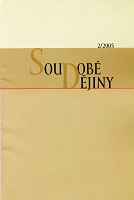Uvědomělé kichotiády Politické myšlení Růženy Vackové
Politically Conscious Quixotes: The Political Thought of Růžena Vacková
Author(s): Adéla GjuričováSubject(s): History
Published by: AV ČR - Akademie věd České republiky - Ústav pro soudobé dějiny
Summary/Abstract: Růžena Vacková (1901-1982) was an important classical archaeologist, philoso¬pher of aesthetics, art historian, and prisoner of both the Nazi and the Communist régimes. The latter tried to expunge her from the history of scholarship and socie¬ty, but in recent years she has slowly been returning to public consciousness as an expert in her field, a popular figure, and a political symbol. The article examines her essays on the key periods and events beginning in the 1930s, and tries to deter¬mine the intellectual basis of her stance as a citizen and also to put her into the context of twentieth-century Czech political thought. With her journalism, Vacková joined the moderate nationalist rightwing in the 1930s. From her analysis, for example, of conceptions of national unity and the crisis of democracy there emerged the special connection of elements of national¬ism, organic thinking about society, and a conception of politics of appeals, which have been typical of modern Czech political thinking. The article also presents an interpretation of Vackova's problematic journalism in the Second Republic (the six months from the Munich Agreement in late September 1938 to the beginning of the German Occupation in mid-March 1939) and the Protectorate (and then her participation in the resistance to the occupation, followed by her imprisonment).
Journal: Soudobé Dějiny
- Issue Year: XII/2005
- Issue No: 02
- Page Range: 285-309
- Page Count: 24
- Language: Czech

